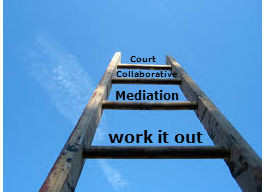
Karen E. Rushing, Clerk of Court and County Comptroller, Sarasota County, Florida
Family Court Filings increased by 4 percent in 2015 in Sarasota County.
My local Attorney Bar Newspaper for Sarasota County, The Docket, had an article from our Clerk of Court, Karen E. Rushing. She provided a three-year review of cases filed in her jurisdiction. According to her statistics, many areas of case filings were down over the past three-year period. However, the area of Family Law had a four percent increase in filings; from 3,954 in 2014 to 4,110 in 2015. (The Docket, February 2016, Karen E. Rushing)
I am conducting a survey of Collaborative Law Cases in our area presently, and so far I am aware of at least 40 cases handled in a collaborative manner last year. While I am very happy to see that this number of families have been helped by this team approach to family law, I am extremely sad to see that this is still less than one percent of the total number of filings. This means that 99% of the families going through difficult transitions of divorce, post-divorce and paternity issues are not being assisted with a collaborative team approach to resolving their case.
I would love to see these numbers reversed. I know that a few people need to resort to the courts to resolve differences of opinion about their divorce or paternity cases. These people may have families that suffer from domestic violence or such severe disagreements that the only way to resolve the case is by having the intervention of a Judge to decide the case. Yet I also know that the vast majority of cases would be better served by the guidance of collaboratively trained attorneys, financial and mental health professionals to find solutions that best suit their family.
If you would like to learn more about how your family can avoid the costs, time delays, anxiety and conflict of litigation please contact my office to learn more about the Collaborative Law Process and how it can help you and your family. Visit my Website for more information: www.odayresolutions.com




